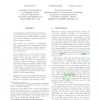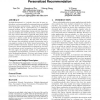15 search results - page 3 / 3 » Interpreting social science link analysis research: A theore... |
ATAL
2010
Springer
13 years 6 months ago
2010
Springer
Multi-agent learning is a crucial method to control or find solutions for systems, in which more than one entity needs to be adaptive. In today's interconnected world, such s...
VLDB
2004
ACM
13 years 10 months ago
2004
ACM
Link analysis methods show that the interconnections between web pages have lots of valuable information. The link analysis methods are, however, inherently oriented towards analy...
HICSS
2003
IEEE
13 years 10 months ago
2003
IEEE
This paper presents research on the application of the means-end chain (MEC) framework for investigating customers cognitive structure regarding community applications. It is argu...
HICSS
2008
IEEE
13 years 11 months ago
2008
IEEE
The digital divide is a complex and dynamic phenomenon. Despite extensive studies on the digital divide and its impact, developing countries, in particular, are still searching fo...
CIKM
2008
Springer
13 years 7 months ago
2008
Springer
Multiple-dimensional, i.e., polyadic, data exist in many applications, such as personalized recommendation and multipledimensional data summarization. Analyzing all the dimensions...


